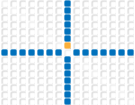Nerval, Gérard de oldala, Angol életrajz
Életrajz
Gérard de Nerval (May 22, 1808 – January 26, 1855) was the nom-de-plume of the French poet, essayist and translator Gérard Labrunie, the most essentially Romantic among French poets.Two years after his birth in Paris, his mother died in Silesia whilst accompanying her husband, a military doctor, a member of Napoleon's Grande Armée. He was brought up by his maternal great-uncle, Antoine Boucher, in the countryside of Valois at Mortefontaine. On the return of his father from war in 1814, he was sent back to Paris. He frequently returned to the countryside of the Valois on holidays and later returned to it in imagination in his Chansons et légendes du Valois.
His flair for translation was made manifest in his translation of Goethe's Faust (1828), the work which earned him his reputation; Goethe praised it, and Hector Berlioz later used sections for his legend-symphony La Damnation de Faust. Other translations from Goethe followed; in the 1840s, Nerval's translations introduced Heinrich Heine's poems to French readers of the Revue des deux mondes. In the 1820s at college he became lifelong friends with Théophile Gautier and later joined Alexandre Dumas in the Petit Cénacle, in what was an exceedingly bohemian set, which was ultimately to become the Club des Hashischins. Nerval's poetry breathes a Romantic deism, a sentient universe full of dream images and esoteric signs. Among his admirers was Victor Hugo.
Gérard de Nerval's first nervous breakdown occurred in 1841. A series of novellas, collected as Les Illuminés, ou les precurseurs du socialisme (1852), on themes suggested by the careers of Rétif de la Bretonne, Cagliostro and others, he gave shape to feelings that followed his third attack of insanity. Increasingly poverty-stricken and disoriented, he finally committed suicide in 1855, hanging himself from a window grating. He was interred in the Père Lachaise cemetery in Paris.
http://en.wikipedia.org



